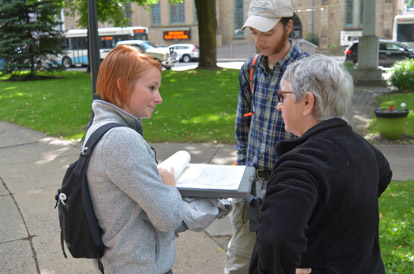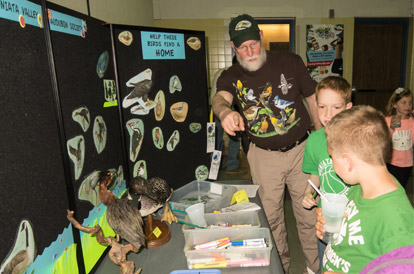Johnstown’s Growing Business Economy
September 12, 2017
Vision2025
September 12, 2017Juniata Valley Audobon Society

JVAS has educational activities for young and old alike, such as this interactive display on wetland birds for the Juniata Valley Elementary School’s Science Festival last May.
Thanks to the efforts of local conservationists, Juniata Valley Audubon Society (JVAS) was approved as a local Audubon chapter in 1969 and has been an active voice for conservation in our area for the past 48 years. JVAS is one of the state’s 21 Audubon chapters scattered across Pennsylvania, and has over 300 members.
Members of the Juniata Valley Audubon Society live in southcentral Pennsylvania: Blair, Bedford, Huntingdon, Mifflin, Centre, and Cambria Counties. They support the chapter mission: “The conservation and restoration of natural ecosystems, focusing on birds, other wildlife, and their habitats for the benefit of humanity and the Earth’s biological diversity.”
Juniata Valley Audubon Society accomplishes its mission through advocacy, science, land stewardship, and education — working directly with Audubon Pennsylvania, the Pennsylvania state office of the National Audubon Society, as well as the National Audubon Society.
Our evening programs and field trips are free and open to the public. We meet at the Bellwood-Antis Library in Bellwood for our monthly evening programs from September through May. Because our members are interested in a wide range of nature-related topics, and because birds are part of a complex web of life, we offer a variety of nature programs ranging from birds to native plants to insects to climate change. Please check our website, www.JVAS.org, for more details on upcoming evening programs.
Our field trips are a popular event for nature explorers of all ages. We visit natural areas, state parks, and privately owned forests to explore the wonders of nature. We are not solely focused on birds, but explore whatever wonders nature offers. Our field trips are scheduled from September through June, so check our website for more details.
JVAS members receive printed programs of the meetings and field trips, but from time to time members volunteer to lead additional trips on a more impromptu basis, so we encourage everyone with access to the internet to subscribe to our blog, “like” our Facebook page, and/or join our listserv to stay apprised of upcoming events.
In addition to education, we are also an advocacy community. We would love to have more folks join us, so if one of these issues concerns you, please contact us to get involved:
- Hawn’s Bridge Peninsula, part of the Raystown Dam Natural Heritage Area in Huntingdon County, is threatened by a proposed marina and resort. The Army Corps has deemed that no development will be permitted for now, but that may change when the Master Plan is updated.
- Heller Caves, adjacent to the Lower Trail east of Hollidaysburg, may be destroyed by a proposed limestone quarry, ruining critical habitat for a species of springtail (a primitive arthropod found nowhere else in the world), and threatened bats. JVAS led a successful effort in 2011 to stop a small quarry, but now the developer wants to open a large quarry that will destroy habitat not only for the Heller Caves wildlife, but also for nesting songbirds like the Cerulean warbler – a threatened songbird.
- The Mariner East II Pipeline will carry up to 700,000 barrels per day of natural gas liquids (propane, butane, and ethane) through our chapter area. The current construction has caused inadvertent spills, but the more critical concern is the safety issue of the pressurized liquid. If gas escapes from the pipeline, there is the potential for explosion in a blast area that extends 1,000 feet on both sides from the pipeline.
- Many of the mountains in our chapter area are changing from wilderness into an industrialized landscape due to the proliferation of industrial wind turbines. Pennsylvania does not have viable wind resources that allow companies to harvest the wind economically; instead they harvest subsidies when they build turbines on our mountains. These turbines kill birds and bats, degrade our high-quality and exceptional value streams, and create health issues for many people living close to them. JVAS has been successful in stopping some projects, but more are proposed.
- To end on a positive note, we are helping to protect migrating songbirds both here at home and in their wintering habitat. One easy way is to buy shade, organic coffee, since that kind of coffee farm is great habitat for many of our birds. Contact us if you would like to purchase some great-tasting coffee that we sell to help bird conservation in Honduras. JVAS members have visited the coffee farm in Honduras and we’re working with the landowner to promote ecotourism that helps birds and people.
